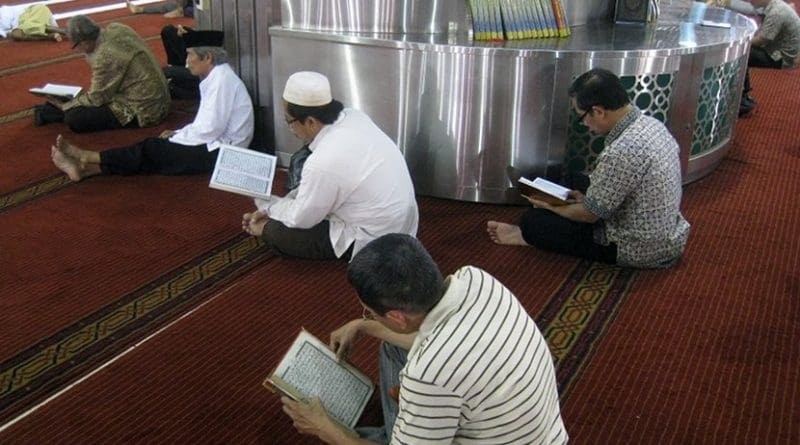Indonesian Election: Muslim Parties Seen Losing Votes – Analysis
By BenarNews
By Rina Chadijah and Ahmad Syamsudin
Established Islamic parties are likely to lose votes to their nationalist counterparts in next week’s elections in Indonesia, analysts said, despite perceptions of growing religious conservatism.
Several recent polls suggest that nationalist parties will dominate the 575-strong House of Representatives (DPR), with the ruling Indonesian Democratic Party of Struggle (PDIP) expected to win the most votes in the April 17 election.
Indonesia’s main faith-based party, the Prosperous Justice Party (PKS), is not expected to repeat its 2014 performance, when it won 6.8 percent of the votes, while the more moderate United Development Party (PPP) and National Mandate Party (PAN) may not secure enough votes to pass the 4 percent threshold required to hold a seat in parliament, recent polls suggest.
PPP and PAN won 6.5 and 7.6 percent of the votes in the 2014 parliamentary elections, respectively.
The National Awakening Party (PKB), a member of the ruling coalition that backs President Joko “Jokowi” Widodo’s bid for reelection, is the only Islamic party expected to secure its parliamentary seats.
“Despite the recent symptoms of identity politics, nationalist parties are expected to dominate,” said Ari Nurcahyo, director of PARA Syndicate, a private think tank.
“Islamic parties are struggling with a lack of popular figures and innovative ideas,” he said.
“Besides, many Indonesians don’t believe in mixing religion and politics, and many have grown weary with misuse of religion in politics while corruption remains rampant,” he told BenarNews.
The arrest of PPP chairman Muhammad Romahurmuziy, an ally of Jokowi, has further alienated voters from the party, he said.
Indonesia’s Corruption Eradication Commission arrested the PPP leader in mid-March on suspicion he accepted a sizeable bribe to engineer a promotion at the Religious Affairs Ministry, an allegation he denied.
Arsul Sani, PPP secretary-general, said he was optimistic that Romahurmuziy’s legal trouble would not have a significant impact on the party’s performance at the ballot box.
“PPP is an Islamic party that has been participating in elections for a long time and we are confident that we will still have a place in the hearts of the people,” he said.
Diverted
Up to nine of 16 political parties contesting the election may not pass the parliamentary threshold, surveys conducted by pollsters Charta Politika in March and Indopolling Network in April predicted.
Gerindra, the party of Jokowi’s rival in Wednesday’s presidential election, Prabowo Subianto, is expected to finish second, followed by Golkar, the party of the late former president Suharto.
Both PDIP and Gerindra are likely to benefit from having their own presidential candidates, whose campaigns have dominated headlines and eclipsed the parliamentary race, analysts said.
“Voters are more likely to vote for parties that field presidential candidates. That could be the reason why Islamic parties are diverted to nationalist parties associated with the presidential candidates,” said Arya Fernandes, a researcher at the Centre for International Studies in Jakarta.
Ardha Ranadireksa, a researcher with Charta Politika, a private pollster, said that even though PKS is known for the loyalty of its members, it does not have popular politicians, forcing it to back Prabowo’s candidacy.
“FPI members who support Prabowo will not necessarily vote for PKS,” he said, using the acronym for the Islamic Defenders’ Front, a hardline group.
FPI is led by Islamic cleric Muhammad Rizieq Shihab, who shot to political prominence after he led a campaign in 2016 and 2017 to oust then-Jakarta Gov. Basuki “Ahok” Tjahaja Purnama, a Christian of Chinese descent, over allegations that he had insulted the Koran in off-the-cuff remarks.
The events leading to Ahok’s jailing raised concerns about growing religious intolerance in the world’s largest Muslim-majority country. The former governor finished serving his sentence in January.
Sirojuddin Abbas, an analyst at Saiful Mujani Research and Consulting, said simultaneous presidential and parliamentary elections meant that political parties not fielding presidential candidates had to work extra had to win votes.
Despite religious fervor on display at Prabowo’s campaign rallies, PKS and PAN, which also backs Prabowo, are likely to benefit little, he told BenarNews.
New political parties
Ardha said new political parties such as the youthful Indonesian Solidarity Party (PSI) had had difficulty garnering support because their platforms were not different from established ones.
PSI is fielding candidates under 40 to attract young voters but is not likely to gain traction in the absence of popular figures, Ardha said.
The secretary general of the Indonesian Solidarity Party (PSI), Raja Juli Antoni, said he was optimistic despite the gloomy predictions.
“We continue to work door to door. We knock on people’s doors and their hearts and we also knock on heaven’s door,” he told BenarNews.

